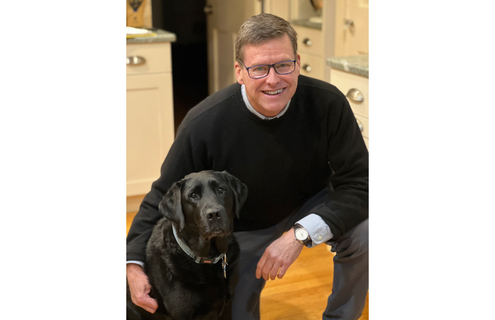
Charlie Wheelan, PhD, MPA, is an economist, speaker, founder, and co-chairman of The Centrist Project, and author of Naked Statistics, Naked Economics, and Naked Money. He is currently a senior lecturer and policy fellow at the Rockefeller Center at Dartmouth College.
You would think he wouldn’t have time to volunteer, but Wheelan makes it a priority to give back to the community. He’s the Vice Chair of the Board of Trustees at Alice Peck Day Memorial Hospital and he volunteers at Dartmouth Health and APD with his therapy dog, Caicos. We asked Wheelan to tell us more about who he is, what he does, and why he does it.
Who are you and what do you do?
I teach public policy at Dartmouth and write books for lay readers about topics like economics and statistics. Of late, I’ve also been writing fiction. I published a novel in 2019 called The Rationing about a global pandemic. Little did I know that that one would become nonfiction! I’m also the founder of a political reform group called Unite America since I believe fixing politics is essential to fixing policy, especially healthcare. A friend once described me as a “public policy handyman.” That’s a pretty good description of my professional life.
How long have you been a board trustee at APD?
It’s been more than five years now — but wow have we been through a lot. When I joined the board, we were working on integrating into the D-H system. Then Covid hit. And, through it all, we have been dealing with the broad challenges of American healthcare and the specific challenges of improving community health in the Upper Valley, which is a crucial part of APD’s mission.
Why do you lend your time and energy to APD?
It’s hard to imagine not being a trustee. APD is so woven into the fabric of the Upper Valley that it touches just about everything I care about. APD attracts wonderful people, both as employees and as trustees.
Do you have any hobbies?
Like so many people in our area, I love to be outdoors doing whatever is appropriate for the season: golf, hiking, biking. I discovered platform tennis during Covid, and that has been a blast. Sometimes I’m happy when it rains just because it keeps me indoors for a while.
Tell us about your family.
My wife Leah is the principal of the Hanover Street Elementary School in Lebanon. She sees a lot of the same challenges in her communities that APD is working to address: food and housing insecurity; the impact of the opioid crisis; the toll of childhood trauma; the need for primary care; and so on.
We have three children, all of whom are now “adulting.” Our oldest is beginning a graduate program in public policy at the University of Michigan this fall. Our middle just finished a graduate program in cybersecurity at Georgetown and is headed to Cincinnati to work in the FBI field office there. And our youngest is a rising junior at Dartmouth studying computer science and human-centered design.
What have you learned about healthcare since becoming a trustee?
I’m reminded of the JFK line shortly after he took office: “I’m shocked to discover that things are as bad as I’ve been saying they were.” I have been teaching about healthcare for decades, and I am still amazed by how broken the incentives are. As everyone in the APD community recognizes we need to build a system that focuses on keeping people healthy rather than treating them only after they’ve become sick. An important part of our mission at APD is improving community health by addressing the underlying social factors that affect it, like housing, but we are swimming against a strong tide.
You have a service dog. Tell us about your time volunteering with Caicos.
It’s amazing how a dog puts a smile on peoples’ faces, including staff. Caicos is a needed distraction in some cases, or something to talk about. Many of the patients had beloved pets during their lives, so Caicos gives them a reason to reminisce. Often, we’ll go to a room where a family is visiting a loved one and someone will say, “Oh, she’s sleeping.” But then the visitors will start petting him, telling stories, and asking questions. I can feel the mood in the room change. I remember a guy saying out loud what I’m often thinking: “Oh, I guess he’s here for us, too, isn’t he?”
The funny thing is that Caicos was raised to be a seeing-eye dog but was released from the program because “he doesn’t like to work.” He loves people but doesn’t particularly like to be told what to do. When we go to the Byrne Center and Alice Peck Day, he gets to visit with new people every week, plus the staff who are always eager to see him. No one has broken the news to him that he’s working.